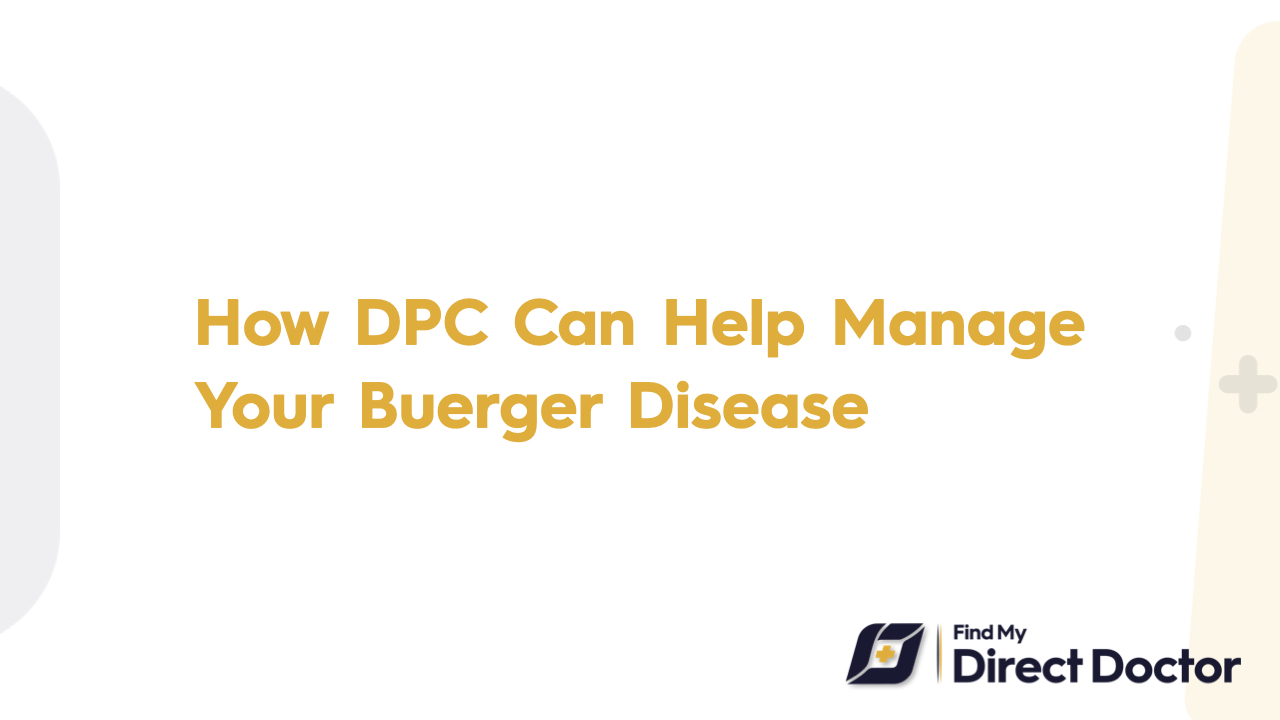



If you have Buerger Disease, you probably got a scary ultimatum: stop using all tobacco or risk losing your fingers, toes, or more. This rare and painful vascular disease mostly affects young smokers. It has one of the clearest cause-and-effect relationships in medicine. The road ahead is hard, but you don't have to go it alone. Direct Primary Care (DPC) is a dedicated, never-ending partnership that focuses on the one thing that matters most: helping you quit smoking for good.
Buerger Disease, also known as thromboangiitis obliterans, is an inflammatory condition that causes blood clots to form in the small and medium-sized arteries and veins in your arms and legs. Buerger's is not like most vascular diseases that are caused by plaque buildup. It is an intense inflammatory process that starts right away when you smoke.
Some common signs are:
Severe pain in the hands and feet, which can happen even when you're not moving.
Fingers or toes that look pale, red, or blue and feel cold to the touch.
Open sores that hurt and take a long time to heal (ischemic ulcers).
Superficial thrombophlebitis is inflammation in veins just below the surface of the skin.
The long-term dangers of smoking are very serious:
The fingers and toes are dying, which is called gangrene.
A very high chance that the affected fingers or limbs will need to be cut off.
Chronic, debilitating pain that makes life very hard.
The disease process doesn't stop until people stop using tobacco and nicotine completely.
In Direct Primary Care (DPC), patients pay a monthly fee to be able to see their doctor as often as they want. The DPC model works especially well for Buerger Disease because the treatment doesn't involve a lot of complicated drugs; instead, it requires a big change in behavior.
This is why DPC is a big deal for people with Buerger Disease:
Constant and intense help to quit smoking: This is the most important part of treatment, and DPC is the best at it. Your DPC doctor has time to do the following:
Regular, in-depth counseling sessions that focus on motivation, strategy, and getting past problems.
Personalized medication plans for quitting smoking aids like varenicline, nicotine replacement, or bupropion, with close monitoring to see what works for you.
Working with mental health professionals to deal with the addiction from a psychological point of view.
A partnership based on trust and not judging each other, with the shared goal of saving your health and limbs.
Taking care of wounds and complications before they happen: Your DPC doctor's availability is very important for dealing with the disease's painful symptoms. This includes taking very good care of ischemic ulcers to help them heal and keep them from getting dangerous infections.
Managing pain and swelling actively to make your life better.
Setting up full dental care to treat severe periodontitis (gum disease), which is very common in people with Buerger's disease and may cause inflammation.
Expert Coordination of a Team from Different Fields: A team approach can help with symptoms, but quitting smoking is the most important thing. Your DPC doctor can work with vascular specialists to look into all the ways to relieve your symptoms, like IV medications (iloprost) or procedures like a sympathectomy.
Make sure that all parts of your care team, including dental and behavioral health providers, can talk to each other without any problems.
Case 1: Michael, 38, a pack-a-day smoker, is diagnosed with Buerger's after he gets ulcers and terrible pain in his fingers. His DPC doctor sets up weekly check-ins for two months, during which he will take his medications and get a lot of counseling. Michael's addiction finally ends with this constant support, and his ulcers slowly start to heal.
Case 2: Daniel, 44, has Buerger Disease and has tried to quit smoking many times. His DPC doctor finds that he has very bad gum disease. By coordinating urgent dental care with a new and caring effort to get Daniel to stop smoking, the doctor is attacking the inflammation from two sides. This helps keep Daniel's condition stable and stops amputation.
Q: Is there a way to get rid of Buerger Disease?
A: There is no medicine or surgery that can fix it. But the disease can be completely and effectively stopped. The only proven way to stop its progression is to completely and permanently stop using all tobacco and nicotine products, including vaping and chewing tobacco.
Q: Can't any doctor just tell me to stop smoking?
A: Yes, but getting over a strong addiction takes more than a five-minute talk. DPC gives you the time for in-depth counseling and a strong, supportive relationship, both of which research shows can greatly improve your chances of quitting for good.
Q: What if I need a heart surgeon?
A: Your DPC doctor will set up the referral and work closely with the surgeon to make sure you know all your options, even if they are limited. Your doctor is still in charge of your team, and their main goal is always to help you quit smoking.
The proof is clear: the only way to keep your arms and legs safe from Buerger Disease is to quit smoking. The DPC model is designed to help you win this battle.
Laser Focus on Stopping: DPC's structure gives you the long-term, intensive help you need to quit smoking.
Holistic, proactive care takes care of related problems like wound care and severe periodontitis to make you healthier and improve your quality of life.
An Empathetic Partnership: Helps you make the hardest and most important choice of your life by building a strong, non-judgmental relationship.
Buerger Disease makes it easy and hard to choose. You don't have to deal with it alone with Direct Primary Care. You get a dedicated, tireless partner who is only interested in one thing: helping you quit smoking for good.

Previous Post